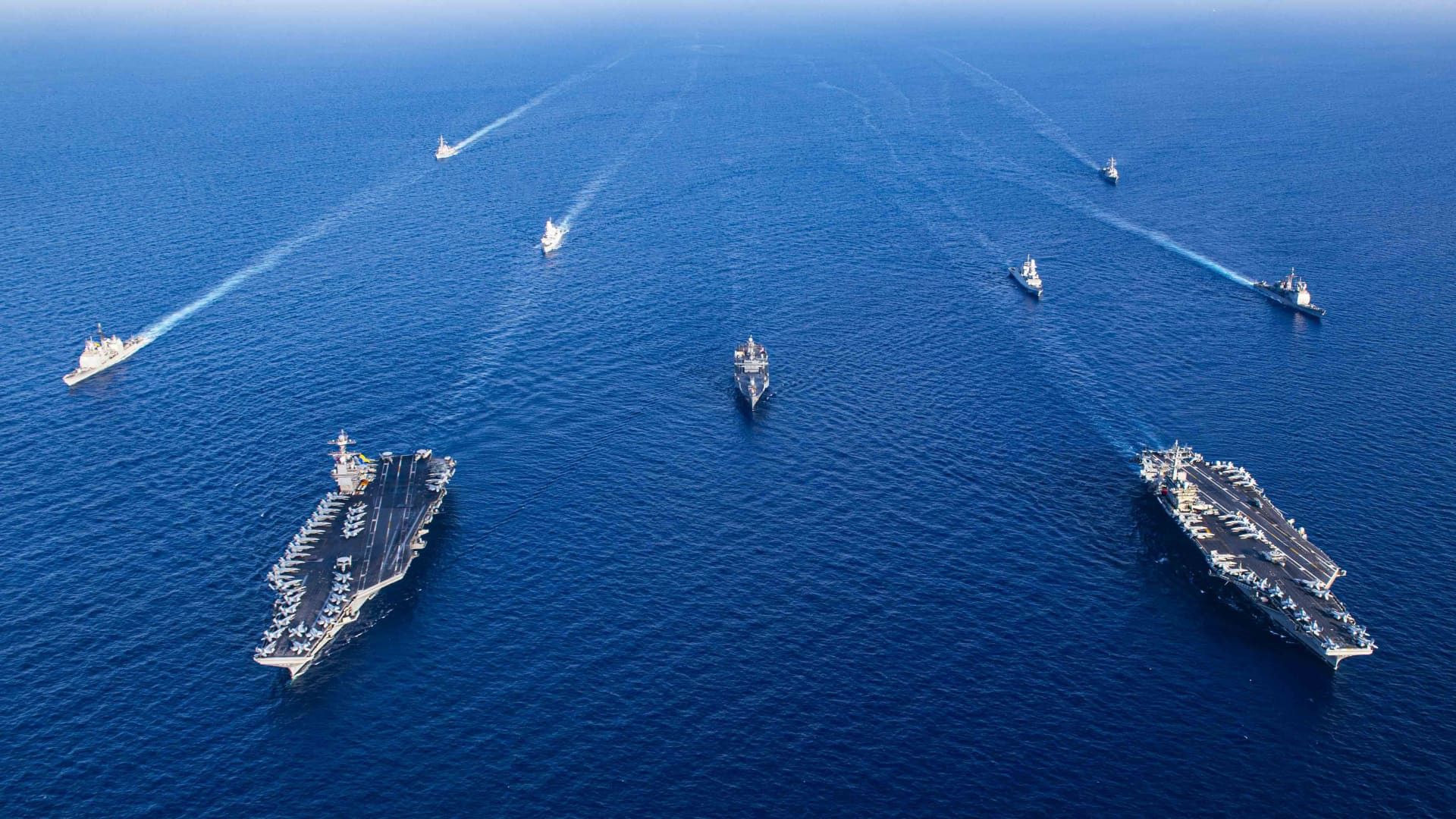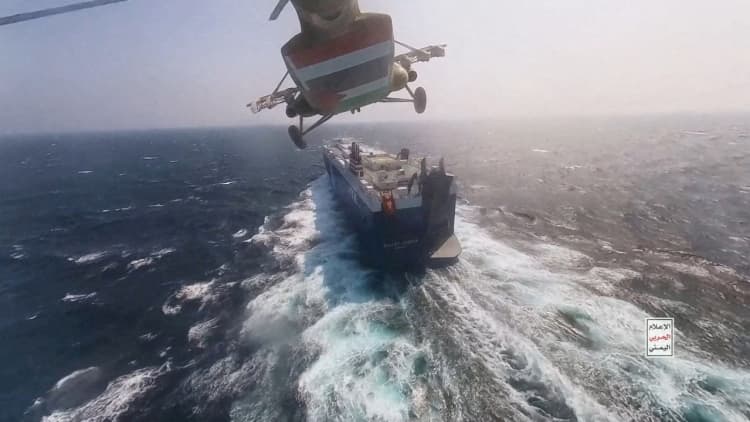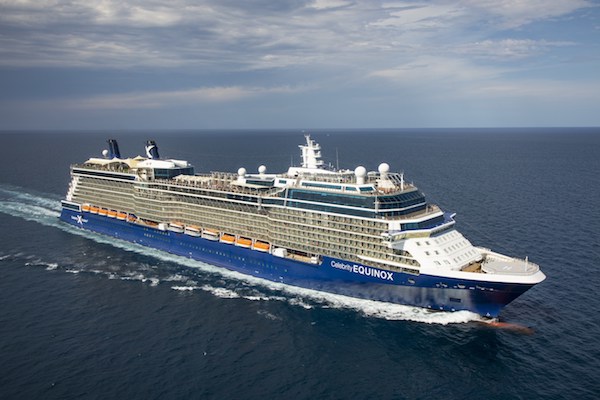White House, Capitol Hill tensions on Red Sea military action are getting dangerous for the global economy
As senators and House members question U.S. Navy defense of foreign-flagged vessels in the Red Sea, critical data on global ocean trade infrastructure is key.

An aerial view of aircraft carriers of the United States Navy USS Gerald R. Ford and USS Dwight D. Eisenhower together in eastern Mediterranean on November 03, 2023.
Anadolu | Anadolu | Getty Images
There are growing calls from some political leaders on Capitol Hill to justify U.S. Navy protection of "foreign flag" vessels from Houthi attacks in the Red Sea, but these lines of inquiry run up against a basic operating truth about the flow of trade: it is global.
U.S. import and export data shows that the majority of the country's trade is on foreign-flagged vessels. In fact, according to U.S. trade data aggregated by MDS Transmodal, less than 3% of trade is carried by U.S. vessels — 97.2% of U.S. trade is transported on vessels that are flagged by foreign nations.
The Congressional calls to consider prioritizing U.S.-flagged vessels come at a time when the Iranian-backed Houthis continue to attack shipping in the Red Sea. According to U.S. defense officials, there have been 40 attacks on commercial shipping. Over the weekend, the U.S. and allies launched the latest strikes against the Iran-backed Houthis rebels, which included targeting of anti-ship cruise missiles. Mohammed Al-Bukhaiti, a member of the Houthis' Ansarallah political bureau, said on Saturday in response that the group's attacks "will continue until the aggression against Gaza stops."
Recently, four senators — including three from the Senate Foreign Relations Committee — asked the White House for the "legal rationale" behind President Biden's "unilateral" decision to not prioritize the security of U.S. vessels in light of the deaths of five U.S. servicemen serving in the region. Other nations, including U.S. ally France, have already declared their priority is to escort French-linked vessels after facing nationalistic pressure.
International law requires commercial vessels to be registered in a country. The country where a ship is registered is identified by that country's flag. Many times insurance and a country's tax environment play a part in a ship's flag state. The Marshall Islands, for example, is a popular registration country for this reason. The flagging norm — which leaves only 2.6% of U.S. trade moved on U.S. flagged vessels — ties the economic interest of the United States to Navy protection of all ships.
At a hearing last Tuesday in the House of Representatives, Charles "Bud" Darr, executive vice president of MSC, the world's largest ocean carrier, was asked by Congressman Salud Carbajal (D-CA) if the U.S. Navy should prioritize security for U.S. flagged ships over foreign vessels.
MSC does not have any U.S.-flagged vessels in its fleet, but it was the No. 1 ocean carrier handling U.S. imports, based on 2023 cargo arrivals data.
"We are a conduit of world trade," said Darr, a former U.S. Navy serviceman. He added that while MSC is foreign-flagged, it does pay U.S. taxes and employs many Americans across its operations.
"Keep the trade lanes open," Darr said. "It comes down to serving the commerce needs of the trading partners and what they need is what we provide."
MSC's ocean alliance partner, Maersk, was No. 1 on handling U.S. exports. Maersk is also a foreign-flagged ocean carrier, but it does have some U.S.-flagged vessels, as do other foreign carriers including Hapag Lloyd.
Representative Carbajal's office did not respond to CNBC's request for comment.
Senate concerns about White House military action
In their letter to the White House, Senator Tim Kaine (D-VA), a member of the Senate Armed Services and Foreign Relations Committees; Senator Todd Young, (R-IN), a member of the Senate Foreign Relations Committee; and Senator Chris Murphy (D-CT), chair of the Senate Foreign Relations Committee's Subcommittee on Near East, South Asia, Central Asia and Counterterrorism, questioned the executive branch authority given the foreign vessel issue.
"It could also be argued that directing military action to defend U.S. commercial shipping is within this power. However, most vessels transiting through the Red Sea are not U.S. ships, which raises questions about the extent to which these authorities can be exercised," they wrote.
In the letter, also signed by Senator Mike Lee (R-UT), the senators asked, "Does your administration believe there is legal rationale for a President to unilaterally direct U.S. military action to defend ships of foreign nations?"
While the senators expressed support for "smart steps to defend U.S. personnel and assets, hold the Houthis accountable for their actions, and deter additional attacks," they said that Congress must carefully deliberate before authorizing offensive military action.

In an email response to CNBC, Senator Kaine's office said the goal of the letter is to understand administration strategy for deterring Houthi attacks, the legal authority for U.S. military action without Congressional approval, and to "avoid the nation sliding into war without the public debate required by the Constitution."
"Senator Kaine and his colleagues seek answers on both the strategy and legal authority for our current actions," the email stated. "A President can act unilaterally to defend the U.S. Beyond that, Congressional authorization is needed," Kaine's office stated. "Senator Kaine believes it's quite clear that action taken to defend foreign flagged commercial vessels, even if strategically advisable, is not 'self defense' by any accepted definition. This would require a Congressional authorization."
Kaine's office also said they would like to know if there is a plan to ask other nations to join in defense of global shipping.
"Military action is also only being carried out by the US and UK, even though other nations' commerce is being directly affected as well, arguably more directly than U.S. commerce," Kaine's statement said.
Nevertheless, the trade data shows the majority of U.S. trade is on foreign vessels.
The White House, as well as the Senate offices of Murphy, Young, and Lee, did not respond to requests for comment by press time.
The U.S. has been conducting Operation Prosperity Guardian as a defensive operation in the Red Sea with more than 20 countries providing support. Defense officials have told CNBC that between four to eight coalition vessels at any given time are monitoring the waters.
U.S. Navy Rear Admiral (Ret.) Mark Montgomery, a senior fellow at the nonpartisan Foundation for Defense of Democracies who served as policy director for the Senate Armed Services Committee under Sen. John McCain, tells CNBC the questions posed by the U.S. Congressional members go against the United States' position in upholding freedom of navigation for all nations as a principle.
Under international law, freedom of navigation is defined as the "freedom of movement for vessels, freedom to enter ports and to make use of plant and docks, to load and unload goods and to transport goods and passengers."
"The percentage of U.S. shipping is 2-3% percent and the number of that 2-3% going through the Red Sea is even lower," said Montgomery. "The United States is for freedom of navigation, transparency, and freedoms of the sea. That means we are for the protection of all shipping including foreign vessels."
In recent testimony on Capitol Hill, trade representatives warned a House subcommittee which oversees maritime transportation that the U.S. economy cannot be separated from the global economy on the issue of Red Sea security. Said one expert: "No shipping, no shopping."
Maersk recently announced two of its American-flagged vessels, the Maersk Detroit and Maersk Chesapeake, were attacked on January 24, during a scheduled U.S. Navy accompaniment for a northbound transit of the Bab el-Mandeb. After those attacks, Maersk announced it would no longer be transiting the Red Sea, a decision also recently taken by Hapag-Llloyd and MSC. Shipping companies are prepared for attacks in the Red Sea that despite U.S. counterattacks, could last from six months to a year.
Montgomery said several issues make it impractical to consider U.S.-flagged shipping as an alternative. The United States has seen a steep decline in merchantmen since WWII, and there is also the issue of building U.S. ships. Materials and labor must be within the U.S., where vessels are more expensive to build and the cost to move ocean freight on a U.S.-flagged vessel is more than on a foreign-flagged vessel.
"We don't have sufficient merchantman, ships, and maintenance," he said.
It's not a new problem, he said, noting that a House Select Committee on China has been asking about this problem. "Congress is well aware of this problem," Montgomery said.

 Hollif
Hollif 
































